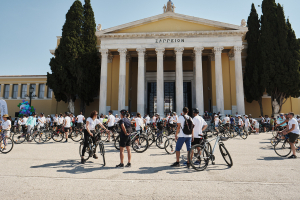XpatAthens
A Foodie Haven In Kerameikos, Athens
Photo Credit: Greece Is
May 1st - Happy May Day!
March 19 - Celebrating Greek Independence Day!
The Acropolis Museum’s Entire Collection Goes Digital
To read this article in full, please visit: ekathimerini.gr
Athens By Bike - The Municipality Of Athens Announces New Cycling Center
- Basic bicycle safety equipment.
- How to do a pre-ride safety check.
- Personal protective equipment for cyclists.
- Essential road rules every cyclist should know.
Monday, Wednesday, and Friday: 19:00 - 21:00
Top 5 Greek Fall Desserts
Milopita - Greek Apple Pie
@cookingwithtatana
Apples are the trademark fruit of fall and that's why milopita is the ideal dessert for the autumn season. Milopita feels like a warm hug in every bite! The flavors of apples, cinnamon, cloves, walnuts, and raisins together just sound so comforting?
Pasta Flora - Greek Jam Tart

@alwayshungry.gr
Pasta Flora is very popular throughout Greece and is basically a type of jam tart. It's commonly eaten for breakfast as much as it is for dessert. Select the jam of your choice - there are various in-season fruits to choose from - and get baking!
Karidopita - Greek Walnut Cake

@seranobakery
As mentioned before, walnuts are a very popular ingredient for Greek desserts, so make the most of them by preparing delicious karydopita! Made from finely ground walnuts, this famous cake is usually served with ice cream and typically doused with alcohol, and finished with honey syrup. The perfect dessert for your autumn and winter dinner parties!
Rizogalo - Greek Rice Pudding

@pieces_of_greece
Rizogalo - meaning rice and milk in Greek - is the Greek version of the popular rice pudding. Heart-warming and cozy, yet perfectly simple, rizogalo is a staple on chilly autumn and winter nights. It can be served either hot or cold but never without a generous sprinkling of cinnamon on top.
Mosaiko - Greek Chocolate & Biscuits Dessert
@myfamilysfooddiary
For chocolate lovers, mosaico is the perfect Greek dessert! It's simple to create, and it basically entails rolling chocolate biscuits into a buttery chocolate concoction that's then chilled to harden. Toss in some nuts, fruit, or alcohol to your liking!
Best Fall Destinations In Europe
And although almost every city is dreamy in the autumn, some cities feel even more magical. Here is a list of our favorite European destinations that you should visit this fall!
Amsterdam
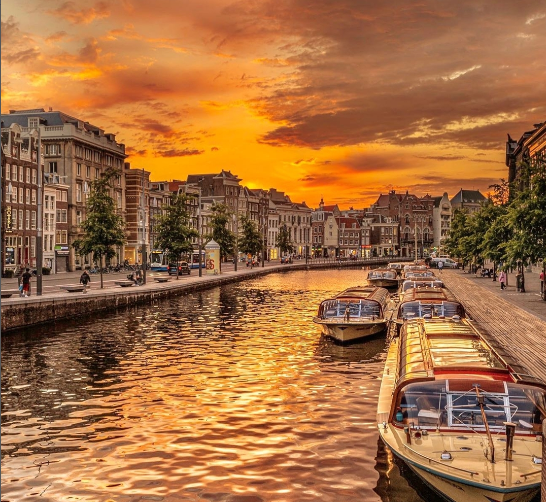
@johnblutephotography
Autumn in Amsterdam is absolutely magical. The trees lining the canals start changing to the warm colors of the season, the city’s bars, restaurants, and cafes become delightfully cozy, and the streets are quieter, making it easy to wander around and take in the beauty that unfolds before you. Not to mention the numerous events you can attend during the fall season, such as the Amsterdam Dance Event in mid-October or the Amsterdam Light Festival at the beginning of November.
Barcelona

@christian_kremser
Barcelona may be a popular summer destination, but autumn is when the city really comes to life, with tons of festivals happening all around. The most famous of all is La Castanyada, or Catalan Halloween, which is a festival to honor the dead and where you can enjoy delicious local food like castanyes (chestnuts) and panellets, a typical Catalan pastry. Except for attending festivals, you can go for a picnic in Ciutadella Park and cherish the magic of nature in all its autumn glory, see a flamenco show, and, of course, visit the museums and most popular sites with no annoying tourist crowds!
Dubrovnik
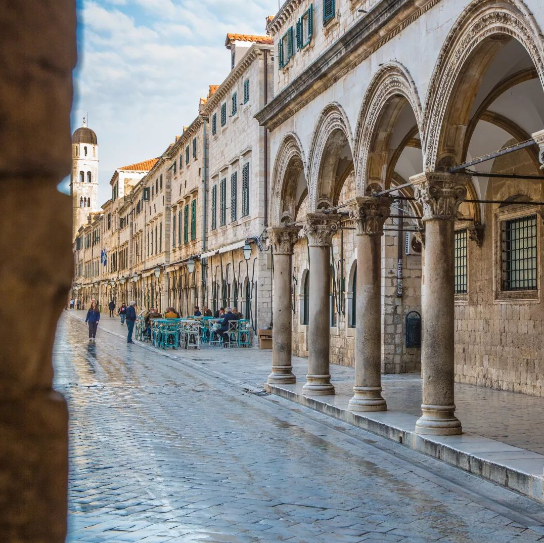
@dubrovnik_tourist_guide
Dubrovnik, the shining jewel in Dalmatia’s crown, is sure to take your breath away if you visit during autumn. The temperatures remain relatively warm, and even the water stays warm through October. You can appreciate Dubrovnik’s historic centre when the crowds have thinned and soak up the last sunny days of the season with a swim or kayaking trip. Make sure to walk up to the top of the Old Town walls, the best vantage point for contemplating the vistas and admiring the city dressed in the golden hues of autumn.
Porto
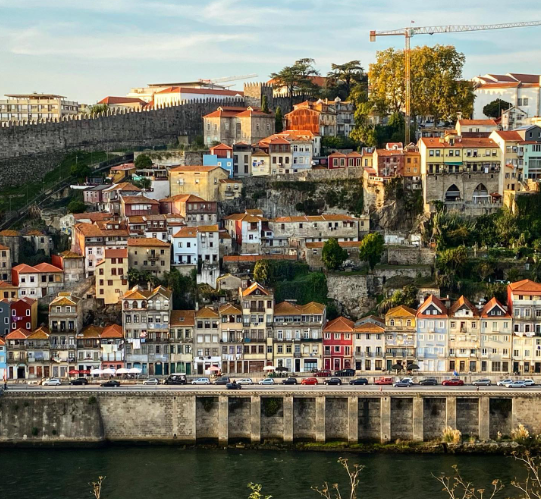
@porto_portugal
The mild weather, the smell of roasted chestnuts, and the less crowded city—autumn in Porto is one of the most memorable things you will ever experience. First, it is the perfect time to discover the Douro valley and its vineyards, listed as a World Heritage site. Pay a visit to the city’s parks, such as the Palácio de Cristal and the Botanic Garden, and sip hot chocolate at cozy cafes, set in former bookstores. Last but not least, make sure to watch a fado show. Fado is the traditional music genre of Portugal, and fado songs are usually connected to the feeling of Saudade, a state of nostalgia and yearning. Once you listen to fado music, you will always carry Porto in your heart!
Bordeaux
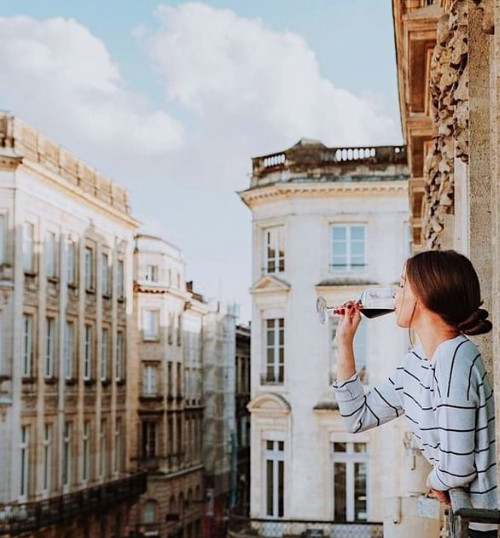
@intercontinental_bordeaux
Named the world’s best city a few years back by Lonely Planet, Bordeaux is a year-round destination, but it shines a bit brighter in autumn. The days are warm, the nights are cool, the countryside begins its dramatic change of color, with fields and hillsides washed in the autumn color palette of mustard yellows, fiery oranges, and burnt reds, and the countless beautiful châteaux and tiny historic towns wait to be explored. Plus, wine lovers will be able to sample the city’s world-famous wines and embark on wine tours of the Medoc region and, of course, the charming medieval town of Saint-Emilion.
Registrations Are Now Open For Run Bike Care
We Run – Bike for a good cause on June 11, 2023
The time has come for all of us to unite and participate for a good cause. This year’s Run - Bike - Care event, organized by the Association of Cancer patients “KEFI of Athens” on Sunday, June 11, 2023, at Zappeion in the center of Athens, as well as in other cities of Greece, invites people of all ages and abilities to run, walk or take their bike in support of the “Mazi kai sto Spiti” program.- Nasos Ghavelas - Paralympic gold medalist in 100m, holder of the world record in the T11 category
- Makis Kalaras - Paralympic silver medalist, world and European discus champion
- Periklis Iakovakis - Olympian and European champion in 400m. with hurdles
- Constantine Dean Karnazes – Greek-American Ambassador of Greek Tourism, ultra-marathoner who has run 50 marathons in 50 consecutive days in 50 different US states
- Maria Polyzou – Survivor, Marathon Runner, Holder of Greek National Marathon Performance
- Michalis Triantafyllidis – former international volleyball player, record holder for appearances with the Greek National Team
- Jo Manta – Ultramarathoner
- Christina Flampouri - has conquered the 7 highest peaks in the world
- Maria Mpekatorou – Journalist - Presenter
- Youlika Skafida – Actress
- Dora Tsambazi - Journalist
- Dimitris Moros – Professor of Physical Education / FitnessArt
- Mandy Persaki – Professor of Physical Education / Pilates by Mandy
- Mamatsita – Gogo Papadionisiou - Food Blogger
Run - Bike - Care / Association KEFI of Athens
Athens To Be Filled With Piano Music As Piano City Returns For Its 2nd Year
Athens Day Cruise – Discover The Saronic Islands In A Day
Step aboard Cosmos, a spacious and modern ship designed with safety and comfort in mind. Whether you choose the VIP lounge with its exclusive amenities or enjoy the open-air deck, attentive staff will ensure your journey is seamless and memorable. Start your day with a rich breakfast and freshly brewed coffee (available at extra charge) as the ship sails toward Hydra, the iconic car-free island.
- Spacious, safe ships with attentive staff
- Multilingual announcements and expert guides
- 2025 TripAdvisor Choice recognized experience
- Free chef-prepared Greek lunch included
- Live Greek music and traditional dancing onboard
- Cosmos ship shop
- VIP options for extra comfort and exclusive perks
Perfect for families, friends, history enthusiasts, and curious travelers alike. Whether you want to soak in culture, explore iconic islands, or simply enjoy a day of sun, music, and Greek hospitality, Athens Day Cruise brings the best of the Saronic Islands together in one unforgettable journey.
Explore 3 Greek Islands In One Day
Stroll cobblestone streets, shop local treasures, savor authentic flavors, and dance to the rhythms of Greece — all in a single day!








